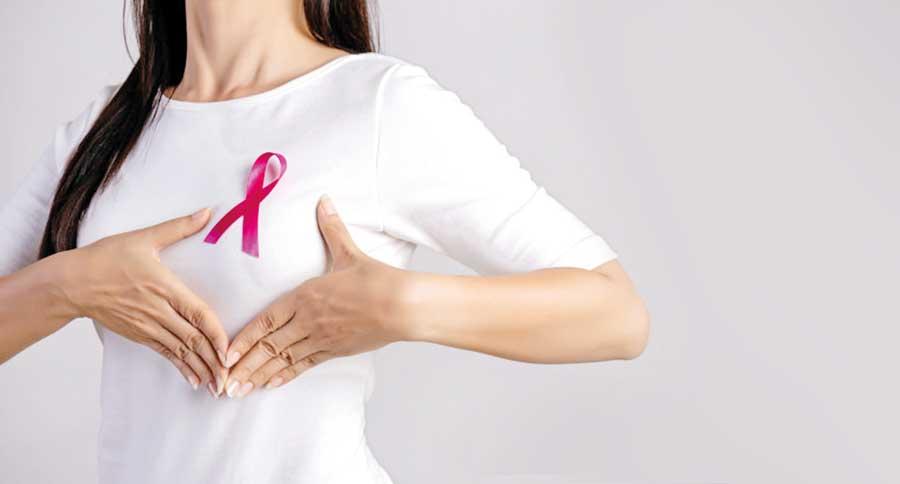18 Oct 2019 - {{hitsCtrl.values.hits}}

 Cancer is defined as an uncontrollable, purposeless abnormal cell growth in any part of the body. When this growth takes place in the breast, it is known as breast cancer. According to the World Health Organization (WHO), breast cancer is one of the most frequent cancers in women, impacting around 2.1 million women each year. In 2018, around 15% of the cancer related deaths in women worldwide was due to breast cancer. Annually, October is marked as the Breast Cancer Awareness Month to increase awareness and support regarding early detection and treatment for breast cancer.
Cancer is defined as an uncontrollable, purposeless abnormal cell growth in any part of the body. When this growth takes place in the breast, it is known as breast cancer. According to the World Health Organization (WHO), breast cancer is one of the most frequent cancers in women, impacting around 2.1 million women each year. In 2018, around 15% of the cancer related deaths in women worldwide was due to breast cancer. Annually, October is marked as the Breast Cancer Awareness Month to increase awareness and support regarding early detection and treatment for breast cancer.
In this back drop, Daily Mirror spoke to Dr. Suraj Perera, Consultant Community Physician attached to the National Cancer Control Programme conducted by the Ministry of Health. Dr. Perera revealed that this Sri Lanka’s theme for Breast Cancer Awareness Month is ‘Be Breast Aware.’ “This theme was chosen to empower females to be aware of their breasts. Then, it is easy for them to detect any early signs of breast cancer. Early detection helps increase chances of survival and causes minimal suffering and intervention.”
Dr. Perera informed that breast cancer is the most common cancer in females in over 160 countries, including Sri Lanka. He stated that around 3500 cases of breast cancer are detected per year and only around 50 cases are related to male breast cancer. Dr. Perera noted that most of these cases come from developed areas such as Colombo, Gampaha, Kandy, Kurunegala. He suggested that whilst there is no scientific basis as to why breast cancer is mostly found in developed and developing regions in the world, sedentary lifestyle and unhealthy dietary habits could be possible causes.
Breast Cancer: Types and Stages
“The breast contains structures such as lobes, ducts and glands (lobules) that open to the nipple and the rest consists of fatty tissues. In Sri Lanka, breast cancer usually occurs due to abnormal growth in glands and ducts.” Dr. Perera revealed. He went on to explain that two most common types of breast cancers in Sri Lanka were the ‘Inter lobular carcinoma’ and ‘Inter ductal carcinoma’.
Inter lobular carcinoma occurs when abnormal cell proliferation occurs in the lobules. Inter ductal carcinoma occurs when abnormal cell proliferation occurs in the ducts.
Another type ‘Triple negative breast cancer’ is where the three receptors that contribute to breast cancer growth are not present in the tumour. Dr. Perera notes that this type is not prevalent in Sri Lanka.
Dr. Perera also shared that breast cancer occurs in four stages.
Stage 1- The tumour is around 2cm and can be easily detected through routine self breast examination.
Stage 2- Palpable lumps in the breast. Lumps are at least 2cm. Tumour is more than 2cm.
Stage 3- The cancer has spread to lower surrounding body like the spine and the chest.
Stage 4- Cancer has spread to distant parts of the body. Cancer deposits might be found in the brains, lungs and liver.

Symptoms
Risk factors
“Studies cannot pinpoint the exact risk factors, however research shows that there are two types of risk factors: Modifiable Risk Factors and Non Modifiable Risk Factors.” Dr. Perera stated. He further went on to explain that modifiable risk factors are factors that a human can control and it can help in prevention of the disease and non modifiable risk factors are factors that is beyond human control.
Modifiable Risk Factors:

Non- Modifiable Risk Factors:
Dr. Perera explained that due to early menarche, breast is exposed to oestrogen hormones from a young age and due to late menopause, the breast is exposed to more oestrogen hormones. Studies have found that high level of oestrogen in the blood increases the chance of breast cancer in women. He also noted that diagnosis of breast cancer due to gene mutation detection is rare in Sri Lanka due to the high cost of the gene testing.
Prevention and detection
“Breast cancer belongs to the preventable group of cancers. If breast cancer is detected early, then it can be treated successfully. A total or near-total cure is possible. When a patient is detected in either stage 1 or stage 2, there is almost a 90% chance of survival.” Dr. Perera informed. He identified 3 key steps for detection of breast cancer.
The first stage of detection is the self breast examination. Dr. Perera recommended that from the age of 20, women should conduct monthly self breast examinations so as to detect any changes in their breasts. He identified two stages in the self breast examination: Observation and Examination. “Women should observe their breasts and be aware of how the breasts normally look like, and check for any visual abnormalities. Then, they should self-examine checking for any lumps, lesions or abnormal fluid leakage.”
The second stage is the Clinical Breast Examination, which is recommended every 3 years for all women aged 20-40 and annually for women aged 40 and above. Dr. Perera revealed that there are more than 980 ‘Well Women’ clinics around Sri Lanka that provide clinical breast examination.
If any abnormality is detected, then a mammogram is conducted with or without ultrasound to diagnose and screen the breasts. This is the final stage of detection of breast cancer. Dr. Perera notes that mammography is available in all the main hospitals in every province.
In Sri Lanka, Dr. Perera notes that majority of the breast cancers are detected after the age of 50. “Only 30% of the cases are detected before 50 years of age.”
Treatment options
Once the cancer is detected, the treatment varies according to the stage the cancer was detected at. In the first two stages of breast cancer, the tumour can be surgically removed with minimum invasion. If the cancer is detected at stage 3, depending on the tumour, surgery is done to remove it followed by radiotherapy. Positive or negative chemotherapy is done based on the pathological report of the tumour. Palliative care may also be provided depending on the severity of the tumour at the stage.
When the detection is done at stage 4, only palliative care is provided. The goal of the palliative care is to improve the quality of life for the patient and his/her family, keeping the patient as comfortable as possible.
Post surgical care
Depending on the stage of the tumour detected and the severity, anti- oestrogen therapy may be prescribed after the surgery. Dr. Perera noted that Tamoxifen is sometimes prescribed to block hormone receptors, preventing hormones that enhance growth of cancerous tumours binding to them. Duration of consuming this medication would also depend on the stage and severity of the tumour.
Dr. Perera recommended breast cancer survivors should have healthy dietary habits as obesity and unhealthy dietary habits can lead to a relapse. He advised that they should conduct routine self examinations to be aware of any changes.
21 Dec 2024 21 Dec 2024
21 Dec 2024 21 Dec 2024
21 Dec 2024 21 Dec 2024
21 Dec 2024 21 Dec 2024
21 Dec 2024 21 Dec 2024